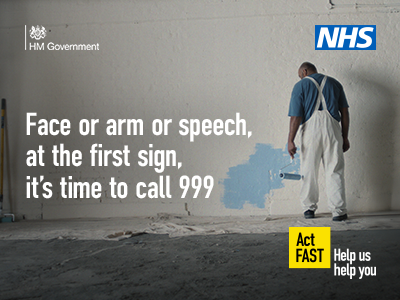South Central Ambulance Service NHS Foundation Trust (SCAS) is supporting a new NHS England campaign designed to increase awareness of the signs of a stroke and encourage people to dial 999 at the first sign.
A stroke strikes every five minutes in the UK. There are around 38,000 stroke-related deaths every year and it’s a leading cause of disability. The campaign encourages people to Act FAST on any sign of stroke as every minute is vital, to give patients quicker access to specialist treatment that could save their life and reduce the long-term effects of a stroke such as a disability.
The campaign explains that the first sign of a stroke might not seem serious. Like struggling to smile, not being able to raise your arm or slurring when you speak. Stroke symptoms can be less dramatic, painful or obvious than might be expected. But even if it doesn’t seem like much, at the first sign of a stroke call 999.
Research conducted in October 2024 with over 2,000 adults in England found that:
- More than half (57%) of respondents believe you should have 2-3 symptoms of a stroke before needing to call 999 first – despite just one being a sign of a medical emergency
- Nearly a quarter (23%) of people would not call 999 immediately if they noticed someone experiencing a stroke – despite it being a medical emergency
- More than two-thirds (67%) of people would not call 999 first if they noticed someone was suddenly struggling to smile, despite facial weakness being a key symptom of stroke
- Almost half (49%) of people wouldn’t call 999 first if they noticed they suddenly couldn’t raise their arm, although it is a key symptom of a stroke
- Nearly four in 10 (39%) of people wouldn’t call 999 first if someone they were with was suddenly slurring their speech, despite this being a key symptom of a stroke
- Over a quarter (26%) of people admitted they are not confident in recognising signs of a stroke
Dr David Hargroves, NHS national clinical director for stroke and consultant stroke physician, said: “When someone has a stroke, it’s estimated they may lose around two million brain cells a minute, which is why rapid response and treatment is critical – the first sign of a stroke might not seem like much, but face or arm or speech, at the first sign it’s time to call 999.
“Thanks to greater awareness of the symptoms and advances in NHS care, more people are now surviving a stroke than ever before, but there is much more to do to help save lives and reduce the long-term impact of strokes. Acting FAST remains vital – whether it is a friend, loved one or even a passer-by, dialling 999 quickly saves lives.”

